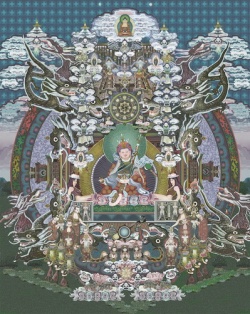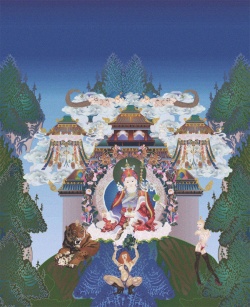Guru Rinpoche
Padmasambhava, an emanation of The Buddha Amitaba, was a great yogi from the region that borders on present-day Pakistan and Afghanistan. He brought Buddhism to Tibet in the eighth century and is affectionately called Guru Rinpoche. He spent more than 55 years in Tibet, manifesting countless wonders and is highly revered by all the schools of Tibetan Buddhism, and especially by the Nyingma.
Guru Padmasambhava gave teachings and transmission of the Vajrayana to hundreds of disciples. His main students, The Twenty Five Disciples, are the root incarnations of the masters of this day. With his principle disciple, Yeshe Tsogyal, he concealed thousands of hidden teachings or Termas in many places for the benefit of future generations.
Some termas are discovered within the Mindstream of realized disciples, and are revealed when most appropriate for the times. In this way each successive generation of students is able to make a new beginning with a fresh revelation that is suited to its particular needs and capacities. Similarly, the distance from The Buddha to the practitioner is very short when a revelation is fresh and direct and there is no possibility of loss or corruption in the line of transmission. Through the Terma tradition the Nyingma school has been able to stay in close and continual contact with the spirit, energy and inspiration of Guru Rinpoche.
Guru Rinpoche appeared miraculously in the blossom of a Lotus in Lake Danakosha, the "Ocean of Milk" in South West Oddiyana. When the king saw the child sitting on the Lotus, he was filled with delight and invited the him to the palace as his son and religious guide. The child was named Padmasambhava, the "Lotus-born."
Padmasambhava killed the son of a wicked minister and transferred his consciousness. As a result he was banished form the country to the fearful cemetery of Sitavana where he gradually he accomplished the common and uncommon Siddhis and came to be known as Rodravajrakala.
In order to inspire Faith towards the teachings in disciples of the future, he traveled to Bodhgaya and many other places receiving teachings from many scholars, accomplished masters and Dakinis. By listening just once, he comprehended and accomplished the whole Vinaya, Sutra and Abhidharma, as well as the teachings of the outer and inner Secret Mantra, oral transmissions, and the pith instructions of the highest tantra of Atiyoga.
He took princess Mandarava, daughter of the king of Zahor, as his consort. In the mountain cave of Maratika, in Nepal, they performed the accomplishment rituals of longevity and actualised the immortal vajra Body.
Guru Rinpoche returned to Oddiyana disguised as a beggar but many people recognised him and he was sent to be burned alive in a sandalwood Fire. When the Fire was lit, he miraculously transformed it into a huge lake filled with lotuses. Seated with his consort on a giant Lotus in the middle of the lake, the king, ministers, and people were astounded and developed great Faith in him. Guru Rinpoche's activities and accomplishments in Tibet
When Lord Buddha gave Avalokitesvara the responsibility of taming the land of Tibet, Avalokitesvara looked at the barbaric land and shed tears of Compassion. From these tears the goddesses Ganga and Gangchungma were born. Gangchungma stole some Flowers and due to her decline in merit she was unable to take Rebirth as a God and took rebirh in the human realm as the woman, Dechogma.
Dechogma naturally had great Faith in the Dharma and commissioned the construction of a magnificent Stupa in Boudha near Kathmandu. Although she died before the Stupa was finished, her sons completed the work. They each prayed to be reborn as a Dharma king, a great learned Khenpo, a powerful tantric master, and a messenger that would bring the other three together.
One son was reborn as Trisong Detsen, the 38th king of Tibet and an incarnation of Manjushri. Another was reborn as the king's messenger who invited the reincarnations of the other two sons, the great Khenpo Shantarakshita and the tantric master Padmasambhava from India. Recalling his past aspirations, Padmasambhava accepted the invitation, and on his way he subdued the demons of Tibet, transforming them into faithful guardians of the Dharma.
The king, Guru and Khenpo together constructed Tibet's first great monastery at Samye. They gave vows to Tibet's first seven monks, standardized translation methods, supervised translation of most of the sutras and tantras from Sanskrit to Tibetan, and firmly established the tradition of study, contemplation and meditation, thereby radiating The Buddha Dharma in Tibet.
Guru Rinpoche miraculously walked upon the entire land of Tibet and blessed all the mountains, lakes and Caves as places for accomplishment. With Yeshe Tsogyal, he concealed eighteen varieties of treasure including texts, material wealth, holy image, and made prophesies regarding the future manifestation of these treasures, including the revealer, the protector of the treasure, and the time of revelation.

